|
|
|
Sort Order |
|
|
|
Items / Page
|
|
|
|
|
|
|
| Srl | Item |
| 1 |
ID:
122484
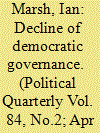

|
|
|
|
|
| Publication |
2013.
|
| Summary/Abstract |
Why has democratic governance declined, at least in the Anglo-American world? This essay maps the causes. It starts with the major parties, once basic agents of mass mobilisation and representation. It argues that a cascading series of developments, often involving contingent adjustments to immediate exigencies, have, in a longer perspective, created a fundamental gap between the political system and its publics. A second section then sketches paths to democratic renewal. How might this gap be closed? What other changes might be required to make this a reality? Are prospects of change fanciful?
|
|
|
|
|
|
|
|
|
|
|
|
|
|
|
|
| 2 |
ID:
122481


|
|
|
|
|
| Publication |
2013.
|
| Summary/Abstract |
From September 2012 most home undergraduates at English universities are being charged fees of £9,000 per annum. These are funded by a government loan, which attracts interest from the moment they start their course; after three years their accumulated debt exceeds £30,000. They can also borrow to cover their living costs, on the same terms, so that those studying in London can graduate with a debt of more than £50,000-although those from low-income families can obtain grants and universities are encouraged to provide bursaries and other support to students from underrepresented groups. Graduates start repaying their debts once their annual income exceeds £21,000-at a rate of 9% of the difference between their income and that figure: until the debt is fully repaid it continues to attract interest, by as much as three percentage points above the current inflation rate. Using data from a calculator on a government website, this paper shows that the highest-paid graduates pay back less than those on middle incomes: the 'squeezed middle' pays back more not only than those on low incomes but also the better-paid and those whose incomes increase more rapidly. This has differential effects according to occupation-and sex; and middle-income groups also contribute more to the costs of widening participation programmes, which all universities charging more than £6,000 per annum are required to fund.
|
|
|
|
|
|
|
|
|
|
|
|
|
|
|
|
| 3 |
ID:
122485
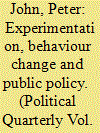

|
|
|
|
|
| Publication |
2013.
|
| Summary/Abstract |
Citizens will need to change their behaviour in pro-social ways if governments are to address current challenges in public policy. But how best to promote behaviour change? The argument in this article is that a decentralised rather than a top-down approach is particularly suitable, which can encourage innovation in the public sector and involve citizens in the implementation of policies. As a method of evaluating interventions, randomised controlled trials have a unique role to play in improving the design of policies, particularly if carried out responsively and adaptively. A culture of experimentation would value curiosity, feedback and the continual testing of interventions. The article includes three examples of experimentation: young people's political attitudes, voter turnout and donations for charity. As the popularity of 'nudge' interventions grows-shown by the success of the UK government's Behavioural Insights Team-the practice of experimentation in the public sector could become the norm.
|
|
|
|
|
|
|
|
|
|
|
|
|
|
|
|
| 4 |
ID:
122482
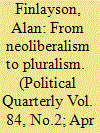

|
|
|
|
|
| Publication |
2013.
|
| Summary/Abstract |
This essay puts into context the debate between Michael Jacobs and Ian Mulheirn, exploring the theories and themes underpinning their arguments, published in issue 84 1 of the Political Quarterly. It discusses, firstly, the roots of Mulheirn's approach in European neoliberalism and, secondly, the roots of Jacobs' approach in a range of sources currently contending for authority over debates within the Labour party. These include themes drawn, broadly, from Polanyi, Keynes, Schumpeter and Schumacher. In a conclusion the article makes the case for a 'pluralistic' to the organisation of political and economic power in the UK.
|
|
|
|
|
|
|
|
|
|
|
|
|
|
|
|
| 5 |
ID:
122486
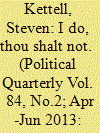

|
|
|
|
|
| Publication |
2013.
|
| Summary/Abstract |
Proposals to legalise same-sex marriage have provoked one of the most high-profile and controversial political debates in recent years. The plans, being introduced by the governments at Westminster and Holyrood, have divided political and public opinion and have attracted widespread opposition from religious groups. However, while religious attitudes to homosexuality are shaped by theological concerns, religious justifications have been largely absent from the case against same-sex marriage. Instead, religious groups have presented their arguments in secular terms centred on tradition, social utility, democratic values and the threat to religious rights and freedoms. This particular framing of the issue reflects processes of secularisation, a growing use of identity politics and the composition of religious groups themselves.
|
|
|
|
|
|
|
|
|
|
|
|
|
|
|
|
| 6 |
ID:
122483
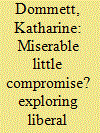

|
|
|
|
|
| Publication |
2013.
|
| Summary/Abstract |
At the half way point of the UK coalition government attention is turning towards the general election, with both parties beginning to contemplate their electoral strategies. This article explores the predicament faced by the Liberal Democrats who, unlike their coalition partners the Conservatives, saw a dramatic decline in support soon after entering government. By exploring a collapse in trust, an apparent identity crisis, and the party's questionable influence, this article seeks to explain the Liberal Democrats' current polling situation and highlight the serious barriers to retaining, yet alone extending their constituency of voters at the 2015 general election.
|
|
|
|
|
|
|
|
|
|
|
|
|
|
|
|
| 7 |
ID:
122480
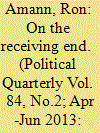

|
|
|
|
|
| Publication |
2013.
|
| Summary/Abstract |
Based on direct observation over a five-year period, the article paints an intimate picture of how the police in Britain are governed. It analyses the complexity of the economic and political environment in which the police have to work: the insecure funding platform; the stream of initiatives, targets and official guidelines; the delicacy of handling community sensitivities; the inherent opaqueness of the national 'tripartite' system of governance; and the constant challenge of making balanced judgements under conflicting pressures. The central theme that runs through the article (which follows on logically from two previous articles published in Political Quarterly) is that of a 'managerialist' political class, with a distinctive ideology and mode of control, trying to get a policy grip on the real world of service delivery: in this instance, policing. Unlike the previous two articles, which had a top-down focus, the emphasis here is primarily on how the thicket looks to those who have to navigate their way through it.
|
|
|
|
|
|
|
|
|
|
|
|
|
|
|
|
| 8 |
ID:
122487


|
|
|
|
|
| Publication |
2013.
|
| Summary/Abstract |
While most nationalised enterprises have been privatised and made subject to the market, the Church of England, with considerable but not complete autonomy, remains ultimately a state controlled and governed organisation. The growth of secularism and religious diversity has demonstrated that the Church has failed in its mission to be the Church of all the people of England. Its share of the marriage market has shrunk to one in four and most weddings are now secular. It retains a monopoly of UK state religious ceremonial but in attempting to adjust to contemporary forms of religiosity it has become, in contradiction of its founding 16th century articles, the leader of official state interfaith activities and the arbiter and broker for the participation of a restricted range of other religious denominations in state activities. Releasing the Church from state control and creating a more open market for religion and belief will create a level playing field for all denominations and a better correspondence between citizen attitudes and public actions.
|
|
|
|
|
|
|
|
|
|
|
|
|
|
|
|
| 9 |
ID:
122489


|
|
|
| 10 |
ID:
122488
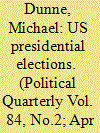

|
|
|
|
|
| Publication |
2013.
|
| Summary/Abstract |
The system for electing the President of the United States remains essentially as it was prescribed in the Federal Constitution drafted in 1787. The individual 50 states (plus the District of Columbia) are accorded a number of votes in the (so-called) Electoral College; each state's Electoral College vote is then attributed to the candidate gaining a plurality (most) of the popular vote in that state; and the candidate with a majority (50% + 1) of these aggregated Electoral College votes is declared the incoming president. What has changed have been the methods of nominating the candidates, chief of which are the political parties from the nineteenth century with their stage-managed quadrennial conventions and the primary/caucus campaigns from the twentieth century which precede and now determine the formal nomination. President Obama's 2012 re-election campaign showed both the crucial importance of the much-maligned Electoral College in winning the presidency and the demographic divisions hidden in the larger American political landscape.
|
|
|
|
|
|
|
|
|
|
|
|
|
|
|
|
|
|
|
|
|